It looks like you're using an Ad Blocker.
Please white-list or disable AboveTopSecret.com in your ad-blocking tool.
Thank you.
Some features of ATS will be disabled while you continue to use an ad-blocker.
share:
a reply to: Madrusa
Well it sounds delightful to me 😊
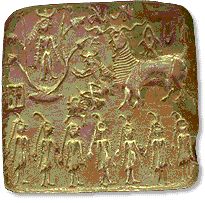
Guess the Goddess from the Pleiades who could produce soma and her bloodline were and are the primary targets of dark forces, its called the “clan practice" (kulacara), “clan religion” (kuladharma), or the “clan generated gnosis” (kulajnana) and is useless to others except as a LARP (common), reason why it didn't catch on elsewhere, yet...
Which really explains the general lack of such.
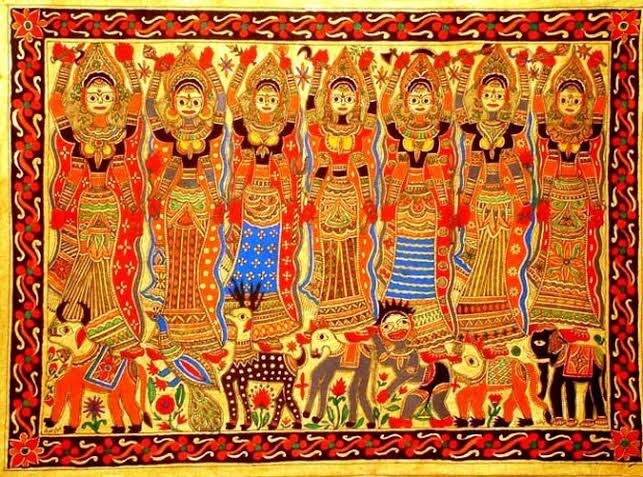
Anyway the other magic ingredient is love ❤

Well it sounds delightful to me 😊
O goddess, the Kula is that supreme and terrifying radiance which is the lord of all, which is all, and is established in all.” [= tejas, radiance, radiant energy]

Guess the Goddess from the Pleiades who could produce soma and her bloodline were and are the primary targets of dark forces, its called the “clan practice" (kulacara), “clan religion” (kuladharma), or the “clan generated gnosis” (kulajnana) and is useless to others except as a LARP (common), reason why it didn't catch on elsewhere, yet...
Without it, there is no mokṣa. Without it, there is no progress. Without it, there is no (supernatural) attainment, especially in the (way of the) Bhairavāgama.
Which really explains the general lack of such.

According to Jagdish Narain Tiwari and Dilip Chakravati, the Matrikas were existent as early as the Vedic period and the Indus Valley civilization. Seals with rows of seven feminine deities or priestesses are cited as evidence for the theory. The Rigveda speaks of a group of seven Mothers who control the preparation of Soma, but the earliest clear description appears in select chapters of the epic Mahabharata dated to 1st century AD. Madhu Wangu believes that Matrika description in Mahabharata is rooted in the group of seven females depicted on Indus valley seals.
Anyway the other magic ingredient is love ❤

edit on 26-1-2022 by primalfractal because: (no reason given)
a reply to: primalfractal
I think they just gave up on trying to explain what Cancer was supposed to represent and decided Turtle, an enigma enclosed within a mystery like the Turtle people in general.
But there is a sense of narrative in the Indus Valley depictions from the singular tree and the balancing of forces of good and evil too the tree divided in two forming the entrance into the Underworld as Gemini and then production of Soma as the key to immortality, represented by Orion and Taurus, in Jemdet Nasr seals the seated woman of the pouring jar and cup before Taurus, that also the basis for Nin-shubur as Orion to be the inter-mediary between humanity and the Divine as the producer of Soma, the drinking of which was supposed to transport one into the Heavens becoming as Taurus.
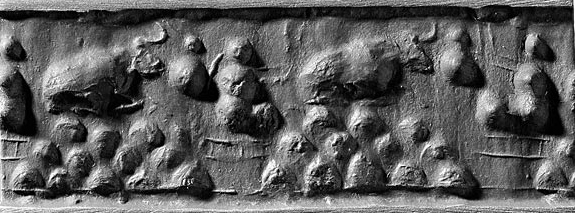
It is maybe the case that there's not much point in trying to teach people in general anything but that the control and distribution of Soma is the key to religious restoration and that's probably a secret of the Turtle people.
Soma thou flowest chasing foes and bringing wisdom and delight: Drive off the folk who love not Gods.
I think they just gave up on trying to explain what Cancer was supposed to represent and decided Turtle, an enigma enclosed within a mystery like the Turtle people in general.
In the Egyptian records of about 2000 BC it was described as Scarabaeus (Scarab), the sacred emblem of immortality. In Babylonia the constellation was known as MUL.AL.LUL, a name which can refer to both a crab and a snapping turtle. On boundary stones, the image of a turtle or tortoise appears quite regularly and it is believed that this represents Cancer since a conventional crab has not so far been discovered on any of these monuments. There also appears to be a strong connection between the Babylonian constellation and ideas of death and a passage to the underworld,
But there is a sense of narrative in the Indus Valley depictions from the singular tree and the balancing of forces of good and evil too the tree divided in two forming the entrance into the Underworld as Gemini and then production of Soma as the key to immortality, represented by Orion and Taurus, in Jemdet Nasr seals the seated woman of the pouring jar and cup before Taurus, that also the basis for Nin-shubur as Orion to be the inter-mediary between humanity and the Divine as the producer of Soma, the drinking of which was supposed to transport one into the Heavens becoming as Taurus.

It is maybe the case that there's not much point in trying to teach people in general anything but that the control and distribution of Soma is the key to religious restoration and that's probably a secret of the Turtle people.
Soma thou flowest chasing foes and bringing wisdom and delight: Drive off the folk who love not Gods.
a reply to: Madrusa
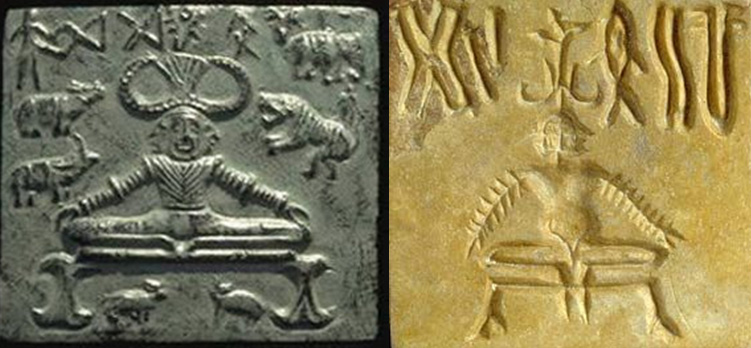
Now it appears the lord of animals is tricephalic, has three heads. Pashupati in the Hindu has five as aspects of Shiva representing the elements and directions, the god/goddess groupings often extrapolate that way. Pashupati was earlier associated with Rudra, the storm god, who is also Shiva, it's all connected somewhat circularly through time and space haha.
Shiva himself is a triple god.
This being Heaven, Earth, and the Underworld. Where it gets interesting is the apparent dispersion and congruity from West to East, of similar three headed forms.
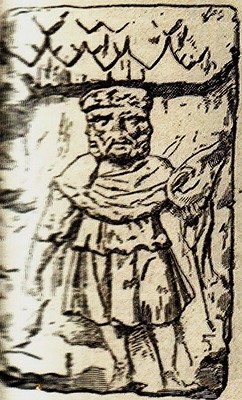
www.flickr.com...
There is some quite old looking tricephalos from all over europe, but I can't find dates for them. Below from Raphoe, County Donegal, Ireland. The Irish ones are identified with Crom Dubh, said to be their oldest God.
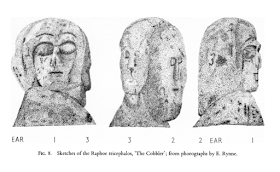
oldeuropeanculture.blogspot.com...
Never ones to feel like they are missing out on something, even if it just makes them look ridiculous and ignorant, the Judeo-Christians thought they'd take a crack at it.
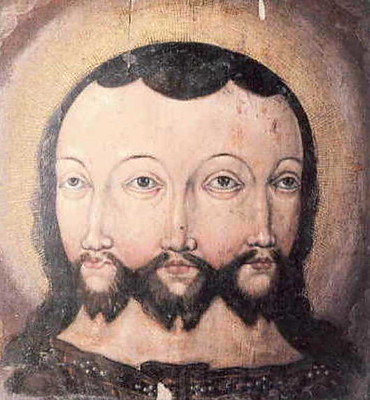
Weird tripping jesus...

Now it appears the lord of animals is tricephalic, has three heads. Pashupati in the Hindu has five as aspects of Shiva representing the elements and directions, the god/goddess groupings often extrapolate that way. Pashupati was earlier associated with Rudra, the storm god, who is also Shiva, it's all connected somewhat circularly through time and space haha.
Shiva himself is a triple god.
Trimūrti (/trɪˈmʊərti/;[1] Sanskrit: त्रिमूर्ति trimūrti, "three forms" or "trinity") is the triple deity of supreme divinity in Hinduism, in which the cosmic functions of creation, maintenance, and destruction are personified as a triad of deities, typically Brahma the creator, Vishnu the preserver, and Shiva the destroyer,
This being Heaven, Earth, and the Underworld. Where it gets interesting is the apparent dispersion and congruity from West to East, of similar three headed forms.
Image of a tricephalic god identified as Lugus, discovered in ancient Paris.
It is possible that Lugus was a triune god, comprising Esus, Toutatis and Taranis.
his Welsh counterpart is Lleu Llaw Gyffes, "The Bright One with the Strong Hand".

www.flickr.com...
There is some quite old looking tricephalos from all over europe, but I can't find dates for them. Below from Raphoe, County Donegal, Ireland. The Irish ones are identified with Crom Dubh, said to be their oldest God.
The Irish word "dar" means by, in a sense "i swear by". This word is used in swears and oaths and invokes the god as a witness. There are several versions of this swear all with the same meaning "by God": "Dar Dia", "Dar Duach" and "Dar Crom"

oldeuropeanculture.blogspot.com...
Triglav is allegedly depicted as representation of three major Slavic gods that vary from one Slavic tribe to others that serve as the representatives of the above-mentioned realms. An early variation included Svarog, Perun, and Dazhbog. Later, Dazhbog was replaced by Svetovid or Veles. Triglav is depicted as a three-headed man sometimes with bands of (gold) blindfolds over his eyes, or a man with three goat heads.
Never ones to feel like they are missing out on something, even if it just makes them look ridiculous and ignorant, the Judeo-Christians thought they'd take a crack at it.

Weird tripping jesus...
edit on 27-1-2022 by primalfractal because: (no reason given)
a reply to: Madrusa
They are dated at 12,000 years because that is when the Clovis event happened. Parts of a comet or 1-2 large asteriods struck the planet, causing an ice age and killing off 97% of life on the planet. The earth revolves in a 25920 year cycle around the sun on what’s called a precession of equinoxes.December 21, 2012 ended the cycle and started it back to 0. Age of Aquarius(the Anti-christ) opposite to the Age of Leo(the time Christ lived in). What some think is that since around 12,960 years ago, these objects that hit and destroyed the planet, might have some that were with it that barely missed back then but will hit the planet this time around. There are some that are coming close the next 20 years that they know of. And they don’t know if the planets magnetism will pull them in also.
Ancient civilizations dated their buildings and monuments by drawing where the constellations were in the sky since over that 25920 year period the stars always would be at a different position. So bulls lions and whatever else they had named the constellations were drawn or etched into everything.
They are dated at 12,000 years because that is when the Clovis event happened. Parts of a comet or 1-2 large asteriods struck the planet, causing an ice age and killing off 97% of life on the planet. The earth revolves in a 25920 year cycle around the sun on what’s called a precession of equinoxes.December 21, 2012 ended the cycle and started it back to 0. Age of Aquarius(the Anti-christ) opposite to the Age of Leo(the time Christ lived in). What some think is that since around 12,960 years ago, these objects that hit and destroyed the planet, might have some that were with it that barely missed back then but will hit the planet this time around. There are some that are coming close the next 20 years that they know of. And they don’t know if the planets magnetism will pull them in also.
Ancient civilizations dated their buildings and monuments by drawing where the constellations were in the sky since over that 25920 year period the stars always would be at a different position. So bulls lions and whatever else they had named the constellations were drawn or etched into everything.
a reply to: primalfractal
That is one reason the figure is considered to relate to Shiva, but what about Janus?
The figure as related to Soma ascended into the Heavens in terms of Shamanic journey and was closely related to the arched portal, the doors of perception as it were, and also of course the past, present and future as the singular concept of Time, the relationship of Janus to the Calendar, to the Zodiac signs.
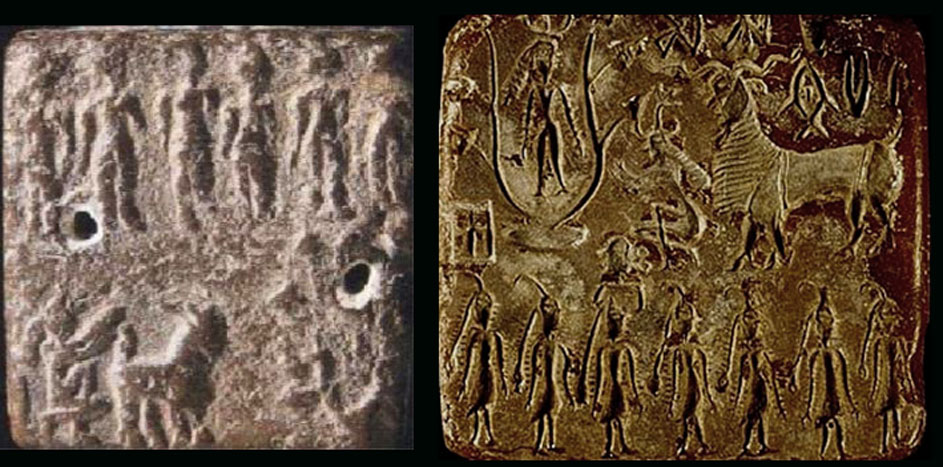
It might be interesting to consider Janus as a Uranic Deity along with other elements related that might be considered Uranic, tree nymphs and Furies in terms of the Tiger woman.
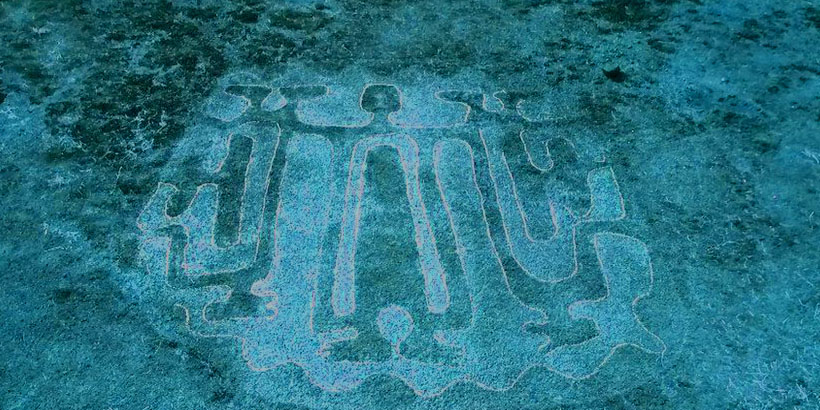
The Union of Gaia with Uranus is the same as the Sumerian tradition of Urash and Anu giving birth to the Pantheon, it is the loss of these Earth born that could be seen as giving birth to Typhon.
a reply to: mcsnacks77
I think it obvious you can't date all petro-glyphs/geoglyphs to that date for those reasons, there are some in Goa for example dated to the Neolithic period around 4,000 to 6,000 years old.
Usgalamil rock engravings
That is one reason the figure is considered to relate to Shiva, but what about Janus?
The name of the god Iānus, meaning in Latin 'arched passage, doorway', stems from Proto-Italic *iānu ('door'), ultimately from Proto-Indo-European *ieh₂nu ('passage'). It is cognate with Sanskrit yāti ('to go, travel'), Lithuanian jóti ('to go, ride'), Irish áth ('ford') or Serbo-Croatian jàhati ('to ride')
The figure as related to Soma ascended into the Heavens in terms of Shamanic journey and was closely related to the arched portal, the doors of perception as it were, and also of course the past, present and future as the singular concept of Time, the relationship of Janus to the Calendar, to the Zodiac signs.

It might be interesting to consider Janus as a Uranic Deity along with other elements related that might be considered Uranic, tree nymphs and Furies in terms of the Tiger woman.
And when Uranus came to lie with Gaia, Cronus castrated his father, and "the bloody drops that gushed forth [Gaia] received, and as the seasons moved round she bore ... the great Giants." From these same drops of blood also came the Erinyes (Furies) and the Meliai (ash tree nymphs), while the severed genitals of Uranus falling into the sea resulted in a white foam from which Aphrodite grew.
The name "Gigantes" is usually taken to imply "earth-born", and Hesiod's Theogony makes this explicit by having the Giants be the offspring of Gaia (Earth). According to Hesiod, Gaia, mating with Uranus, bore many children

The Union of Gaia with Uranus is the same as the Sumerian tradition of Urash and Anu giving birth to the Pantheon, it is the loss of these Earth born that could be seen as giving birth to Typhon.
The mythographer Apollodorus (1st or 2nd century AD) adds that Gaia bore Typhon in anger at the gods for their destruction of her offspring the Giants
a reply to: mcsnacks77
I think it obvious you can't date all petro-glyphs/geoglyphs to that date for those reasons, there are some in Goa for example dated to the Neolithic period around 4,000 to 6,000 years old.
Usgalamil rock engravings
edit on 28-1-2022 by Madrusa because: (no reason given)
a reply to: Madrusa
In the past "giants" was sometimes used as reference to the Indo-Europen tribes from whom the Indus Valley Culture decended.
The Indus Valley was abandoned around 1700 BC for unknown reasons, but there was a loss of trade with the west, climate change, signs of cultic decay, interpersonal violence, and fortifications that posit an outside threat. Quite possibly related to the bigger cultural picture.
The destruction of the giants can be compared with the waning of the matrilinial Indo-European clans and their Goddess religion, culminating in the late bronze age collapse and the fall of Troy.
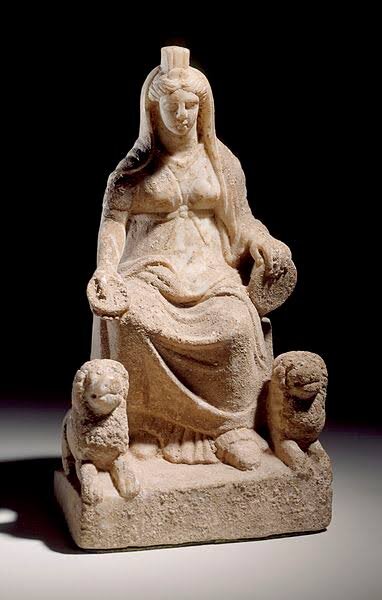
The instigators were the Sea Peoples, who were of course Set/Typhonians. Libya being the center of the ancient Set cult.
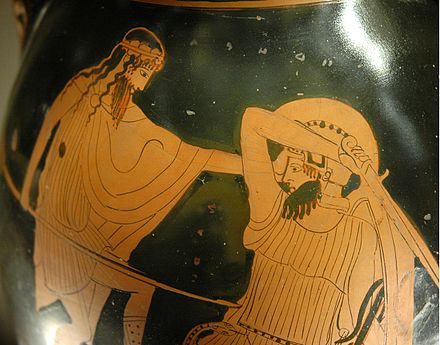
There is evidence of Mycenaean Greek involvement in the Sea People alliance and even some being imported into the Levant at that time who became the Philistines.
The resulting dark age was said to last 400yrs, more realistically we have suffered the depradations of the Set/Typhonians ever since and are only just starting to come out of it now.
In the past "giants" was sometimes used as reference to the Indo-Europen tribes from whom the Indus Valley Culture decended.
The Indus Valley was abandoned around 1700 BC for unknown reasons, but there was a loss of trade with the west, climate change, signs of cultic decay, interpersonal violence, and fortifications that posit an outside threat. Quite possibly related to the bigger cultural picture.
The destruction of the giants can be compared with the waning of the matrilinial Indo-European clans and their Goddess religion, culminating in the late bronze age collapse and the fall of Troy.

Cybele is an Anatolian mother goddess; she may have a possible forerunner in the earliest neolithic at Çatalhöyük, where statues of plump women, sometimes sitting, have been found in excavations. Phrygia's only known goddess, she was probably its national deity.
In Greece, Cybele met with a mixed reception. She became partially assimilated to aspects of the Earth-goddess Gaia. Romans believed that Cybele, considered a Phrygian outsider even within her Greek cults, was the mother-goddess of ancient Troy (Ilium).
The instigators were the Sea Peoples, who were of course Set/Typhonians. Libya being the center of the ancient Set cult.

... the third season, saying: "The wretched, fallen chief of Libya, Meryey, son of Ded, has fallen upon the country of Tehenu with his bowmen – Sherden, Shekelesh, Ekwesh, Lukka, Teresh, Taking the best of every warrior and every man of war of his country. He has brought his wife and his children – leaders of the camp, and he has reached the western boundary in the fields of Perire
There is evidence of Mycenaean Greek involvement in the Sea People alliance and even some being imported into the Levant at that time who became the Philistines.
The Nine Bows were acting under the leadership of the king of Libya and an associated near-concurrent revolt in Canaan involving Gaza, Ashkelon, Yenomand the people of Israel
The resulting dark age was said to last 400yrs, more realistically we have suffered the depradations of the Set/Typhonians ever since and are only just starting to come out of it now.
edit on 30-1-2022 by primalfractal because: (no reason given)
a reply to: primalfractal
There is the connection of Typhon to the Cilician cave, though sometimes he was considered buried under volcanoes as a primeval destructive force, the closest comparison to the Typhonian tradition of the Greeks is Hebyon/Habhaby from Syria..


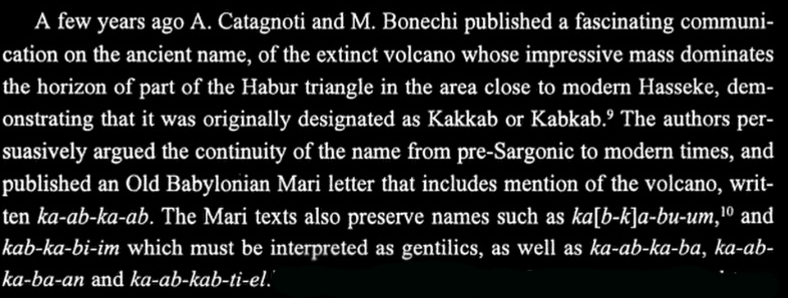
In Habakkuk 3:4 it is Hebyon/Typhon that emerges from the Sinai with Israel as a destructive force.
He of two horns and a tail
There is the connection of Typhon to the Cilician cave, though sometimes he was considered buried under volcanoes as a primeval destructive force, the closest comparison to the Typhonian tradition of the Greeks is Hebyon/Habhaby from Syria..
"I have bound Habhaby. I have bound his tongue. I have found the barrier of his teeth. I have bound you on a black stone by the double doors and struck the Sea (tihamatim) with a reed. I have bound you by seven mighty contraptions. I have bound you by the zidanu and amana. I have bound you by the tails of the Sun and by the horns of the Moon.

Seven youths and seven maidens are exalted, and [...] the Star (kabkabu). The bricklayer will lay the bricks by the double doors of Ellil, father of the gods and the Star has established him as representative to Ellil, father of the gods. Ellil, the father of the gods performs the magic. Spell of the Star. [...] I have bound you on Zazaum, O no-good one. [...] O Sun-god! May you lay the bricks and build the house of Ellil the father of the gods. [...] The Star is appointed as the emissary to Ellil the father of the gods. [...]

The earth has confined the serpent (bashanu); O serpent in the sea (ba-tihamat)! [...] So says the magician Dagama [to the serpent]: 'I have smitten thee'. [...] May Hadd fetch the dazzling stone and the triple-garment for the Star [who was appointed to induce Ellil to perform the magic]".

In Habakkuk 3:4 it is Hebyon/Typhon that emerges from the Sinai with Israel as a destructive force.
God came from Teman, and the Holy One from mount Paran. Selah. His glory covered the heavens, and the earth was full of his praise. And his brightness was as the light; he had horns coming out of his hand: and there was the hiding of his power. Before him went the pestilence, and burning coals went forth at his feet.
He of two horns and a tail
a reply to: Madrusa
That's pretty creepy really, so Habhaby could be considered the earliest form of the Sethian god/demon, the source of the Cabal and the plot to takeover the world for their benefit and everyone else's loss. It connects to the Habiru, who along with the Hyksos and Shasu are considered proto Hebrews.
Along with Sicilian caves and Mt Doom, Jebel Aqra aka Mt Casius is an ancient Canaanite cult site on the Syria/Turkey border that is associated with Typhon in the form of Baal-Zephon.
The name was transferred to Zeus Kasios, "Zeus of Mount Kasios".
There is another mountain, or rather more a mound, with the same name.
Another place definately not on the ancient bucket list was Avaris of the Hyksos, must have been a complete crap heap.
That's pretty creepy really, so Habhaby could be considered the earliest form of the Sethian god/demon, the source of the Cabal and the plot to takeover the world for their benefit and everyone else's loss. It connects to the Habiru, who along with the Hyksos and Shasu are considered proto Hebrews.
Along with Sicilian caves and Mt Doom, Jebel Aqra aka Mt Casius is an ancient Canaanite cult site on the Syria/Turkey border that is associated with Typhon in the form of Baal-Zephon.
It appears in the Hebrew Scriptures as Mount Zaphon (Hebrew: צפון Tsāfōn). In ancient Canaanite religion, Mount Sapan was sometimes accounted as the home of all the gods, not only Baʿal and his sister. As Mount Zaphon, it appears in that role in the Hebrew Scriptures' Book of Isaiah, along with the Mount of the Congregation. From its importance and its position at the northern end of Canaan, it also became a metonym and then the word for the direction "north" in the Hebrew language.
The name was transferred to Zeus Kasios, "Zeus of Mount Kasios".
Tsaphon, or Tsephon, Tsephona, means in Hebrew, and in Phonician, the North, or the darkness, or the shadow, or the winter, or the region of destructive winds; as over against the South, the light, the summer, the region of calm and warmth; “since the ancients regarded the North as the seat of gloom and darkness, in contrast with the bright and sunny South;” as “the dark cold region, where the sun and stars are extinguished, and the light swallowed up.”
The mountain, Robin Lane Fox observes, had an earlier sacred history among the Hurrians, who had known the mountain as Hazzi and placed their own storm god Teshub on its summit. Hittite rulers took up the name of its storm king and his victory over the sea by which he established his "kingship in heaven", according to texts found at the Hittite capital Hattusa
There is another mountain, or rather more a mound, with the same name.
Ras Kouroun, El-Katieh, or El-Kas, also known as Casius Mons in Latin, or Kasion Oros to Greek geographers such as Herodotus (who considered it to mark the boundary between Egypt and Syria), is a small mountain near the marshy Lake Bardawil, the "Serbonian Bog" of Herodotus, where Zeus' ancient opponent Typhon was "said to be hidden".Here, Greeks knew, Baal Sephon was worshipped.
Another place definately not on the ancient bucket list was Avaris of the Hyksos, must have been a complete crap heap.
But, according to Manetho (Josephus contra Apion. 1, 26), the name of Typhon's city was Avaris (Αὔαρις), which some, as Champollion (who writes ΟΥΑΡΙ, and renders "causing malediction;"
Avaris was the Hyksos capital of Egypt located at the modern site of Tell el-Dab'a in the northeastern region of the Nile Delta.
edit on 2-2-2022 by primalfractal because: (no reason given)
a reply to: primalfractal
More properly the deepest though that can be related to the formative/earliest because it's likely the Neptunian archetype and like all planetary archetypes has a Feminine and Masculine expression and can be aligned towards good or evil, of course it's also the hardest to understand. The God with two horns and a tail that was deeper than El/Saturn does correspond to early depictions of Enki.
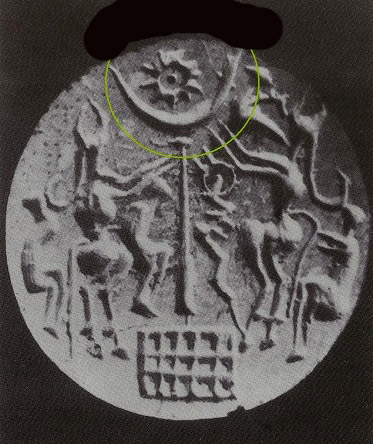
This does then take us back to an Aquarian/Neptunian Deity deeply imersed within nature, Enki the living creatures and Ninhursag the plants, also Habhaby as the babbler, the background hum of nature had correlation to Humbaba and the seven auras as the planetary archetypes.
As related to the Typhonian this is the deepest currents, waves, patterns and flow within nature seemingly all elements;
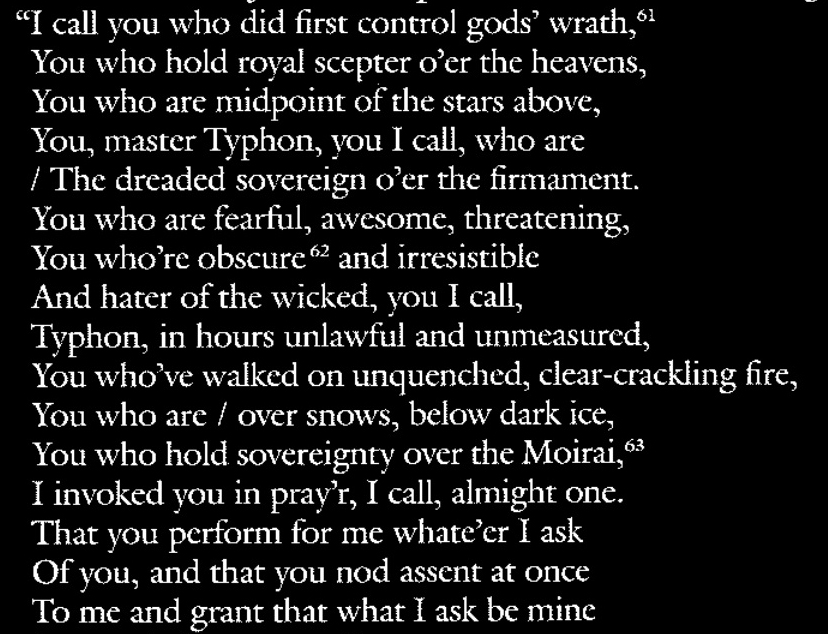
That can also extend to patterns and flow within the Zeitgeist, the rise and fall of movements, tidal waves manifest as religions and ideologies, the Typhonian sorcerer as the top trending on Twitter.
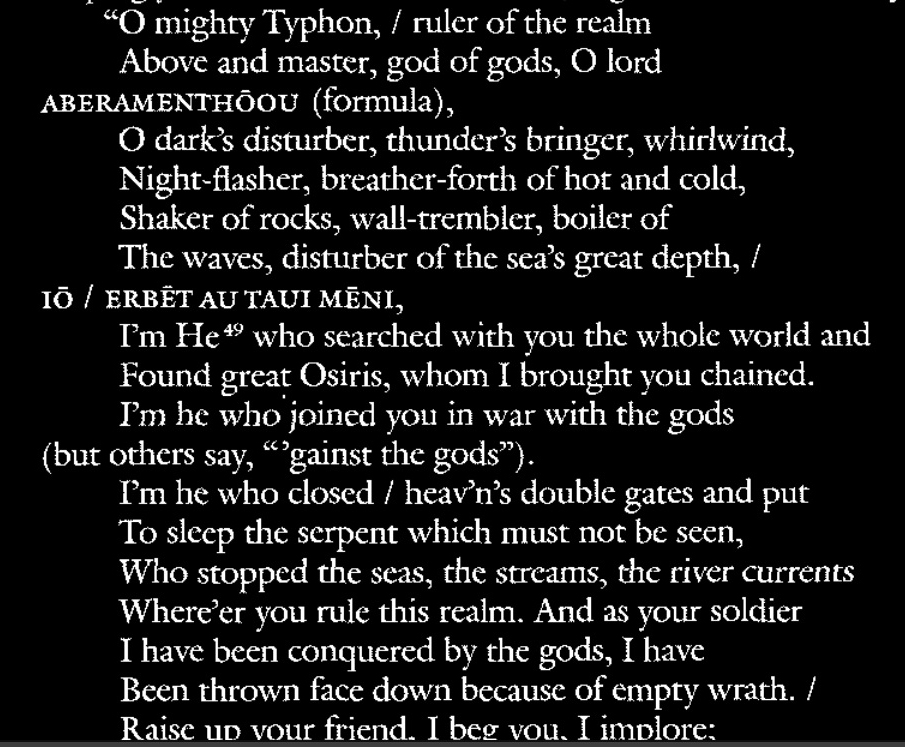
It is the most fundamental archetype in magic and religion, repetitious chanting and utterances in order to generate flow and disturbance within the aether, a basis for ritual, the Seth-Typhonian will generate murmurings of unrest, chants of rebellion and screams of rage towards the overthrowing of natural order, they will also create disturbances in the gene pool, the introduction of the foreign element, the trickle of immigration that turns into a flood, they have the obsession with statistics, polls and populism, Typhonian can perhaps be considered to always relate to the negative manipulation of the deep underlying forces of nature, chaos magic, the Anti-Life principle.
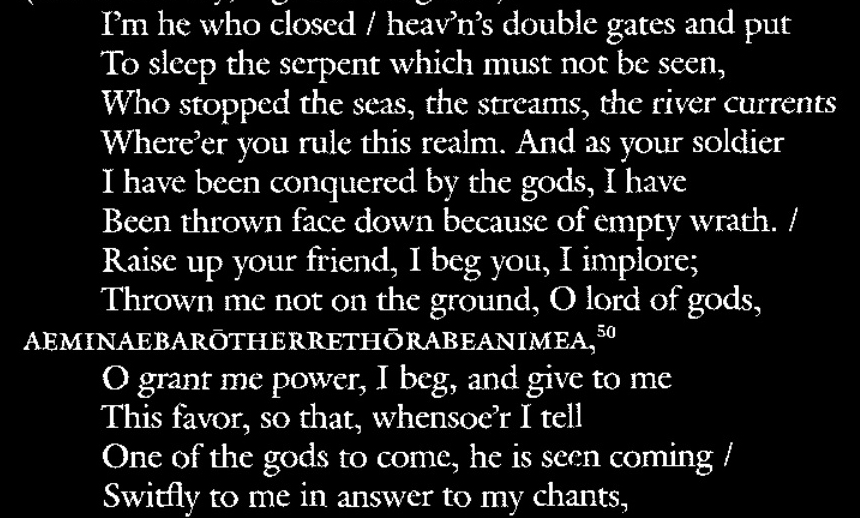
In the positive sense this is the natural harmonies and resonances of life including as with Enki the genetic coding of such and it's an essential factor towards overwhelming change for the better, the wisdom of the deep, also Asar as the son of Enki was the archetype of the Shaman, his daughter something of an enchantress.
More properly the deepest though that can be related to the formative/earliest because it's likely the Neptunian archetype and like all planetary archetypes has a Feminine and Masculine expression and can be aligned towards good or evil, of course it's also the hardest to understand. The God with two horns and a tail that was deeper than El/Saturn does correspond to early depictions of Enki.

This does then take us back to an Aquarian/Neptunian Deity deeply imersed within nature, Enki the living creatures and Ninhursag the plants, also Habhaby as the babbler, the background hum of nature had correlation to Humbaba and the seven auras as the planetary archetypes.
As related to the Typhonian this is the deepest currents, waves, patterns and flow within nature seemingly all elements;

That can also extend to patterns and flow within the Zeitgeist, the rise and fall of movements, tidal waves manifest as religions and ideologies, the Typhonian sorcerer as the top trending on Twitter.

It is the most fundamental archetype in magic and religion, repetitious chanting and utterances in order to generate flow and disturbance within the aether, a basis for ritual, the Seth-Typhonian will generate murmurings of unrest, chants of rebellion and screams of rage towards the overthrowing of natural order, they will also create disturbances in the gene pool, the introduction of the foreign element, the trickle of immigration that turns into a flood, they have the obsession with statistics, polls and populism, Typhonian can perhaps be considered to always relate to the negative manipulation of the deep underlying forces of nature, chaos magic, the Anti-Life principle.

In the positive sense this is the natural harmonies and resonances of life including as with Enki the genetic coding of such and it's an essential factor towards overwhelming change for the better, the wisdom of the deep, also Asar as the son of Enki was the archetype of the Shaman, his daughter something of an enchantress.
a reply to: Madrusa
Indeed she is enchanting.
What gets to me is Set/Typhonian rubbish being popular when it is obviously just that, sure I understand it's an old devious dark spell, Set encompassing all negative male manifestations, but the fundamental wrongness is clear as day to me, if not the intracties that only came with time. Pity the folk who turn on the TV and think it's all OK and management doesn't need to change drastically, yet they annoy me too because they support it even if unaware, slow of mind normies.
And there is so many levels of this unwitting support, a multitude of tailor made cults, from the old to the new limiting choice by being the same black stone dressed in different garments. As a base its falsely implanted into our culture and is inherently popular for that reason, that and the incessant chanters. Any escape runs the risk of going out of the frying pan into the fire.
Anyway it's all becoming less popular these days, conversely the idea that it's all rubbish is growing, and with it the understanding we need to cut this evil at the root.


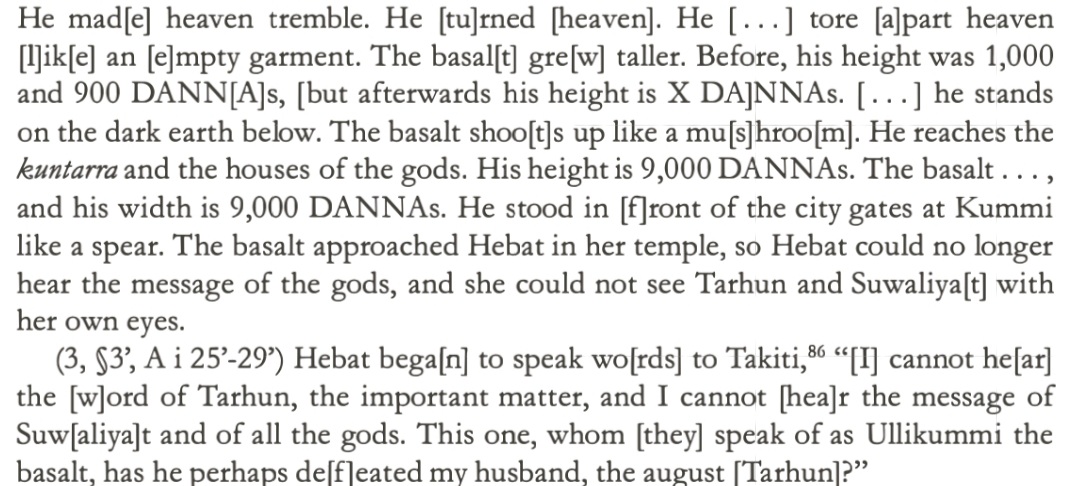
From the Hurro-Hittite account Ullikummi "the basalt" stone giant in this case, who just keeps growing and killing, even to the heights of the Heavens.
Reminiscent of the Tower of Babel in this regard, not that Yhwh is any different to Set either, they are one and the same, but there is always more Set/Typhonian forms lurking...
Indeed she is enchanting.
What gets to me is Set/Typhonian rubbish being popular when it is obviously just that, sure I understand it's an old devious dark spell, Set encompassing all negative male manifestations, but the fundamental wrongness is clear as day to me, if not the intracties that only came with time. Pity the folk who turn on the TV and think it's all OK and management doesn't need to change drastically, yet they annoy me too because they support it even if unaware, slow of mind normies.
And there is so many levels of this unwitting support, a multitude of tailor made cults, from the old to the new limiting choice by being the same black stone dressed in different garments. As a base its falsely implanted into our culture and is inherently popular for that reason, that and the incessant chanters. Any escape runs the risk of going out of the frying pan into the fire.
Anyway it's all becoming less popular these days, conversely the idea that it's all rubbish is growing, and with it the understanding we need to cut this evil at the root.



From the Hurro-Hittite account Ullikummi "the basalt" stone giant in this case, who just keeps growing and killing, even to the heights of the Heavens.
Reminiscent of the Tower of Babel in this regard, not that Yhwh is any different to Set either, they are one and the same, but there is always more Set/Typhonian forms lurking...
Sandalphon is an archangel in Jewish and Christian
writings, although not in scripture. Sandalphon figures prominently in the mystical literary traditions of Rabbinic Judaism and early Christianity, notably in the Midrash, Talmud, and Kabbalah and is generally seen as gathering prayers and passing them on to God.
Physical descriptions of Sandalphon vary depending on the source. He is uniformly depicted as extremely tall—he exceeds Hadraniel (another angel) in height by a 500-year foot journey. During Moses' visit to the Third Heaven, he is said to have glimpsed Sandalphon and called him the "tall angel" (though this legend dates to much later than the time of the Torah). The Babylonian Talmud "Hagigah" 13b says Sandalphon's head reaches Heaven, which is also said of Israfel and of the Greek giant Typhon, with whom Sandalphon seems to have similar mythological roots. He is also described as being a member of the "Sarim" (angelic princes), and a "Hazzan" (master of heavenly song).
edit on 5-2-2022 by primalfractal because: (no reason given)
a reply to: primalfractal
It's all very odd but i suppose the worst thing that could happen is that an evil Earthly power attains Heavenly power through it's upward mobility, it would be best to cut that off at it's base.
I was looking at the Hindu tradition of Aquarius as the water jar Kumbha as in the Kumbh Mela which correlates with Mesopotamian tradition.
Kumbha
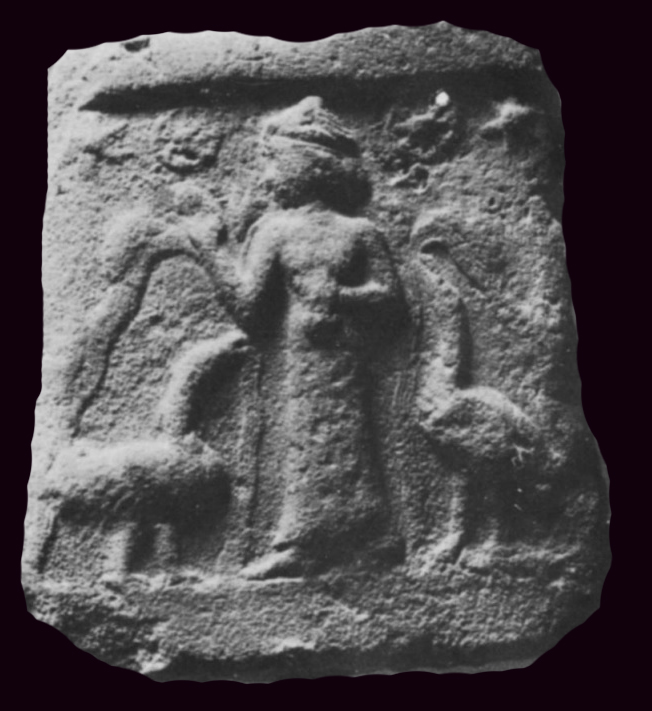
They always come up with a mad version of everything but the elements are traditional, seductive fish nymph Apsaras of the Apsu, and the streams of water from the jar and the fishes contained theirin were understood to extend from Aquarius to Piscis Austrinus, the sages having travelled through those same streams.
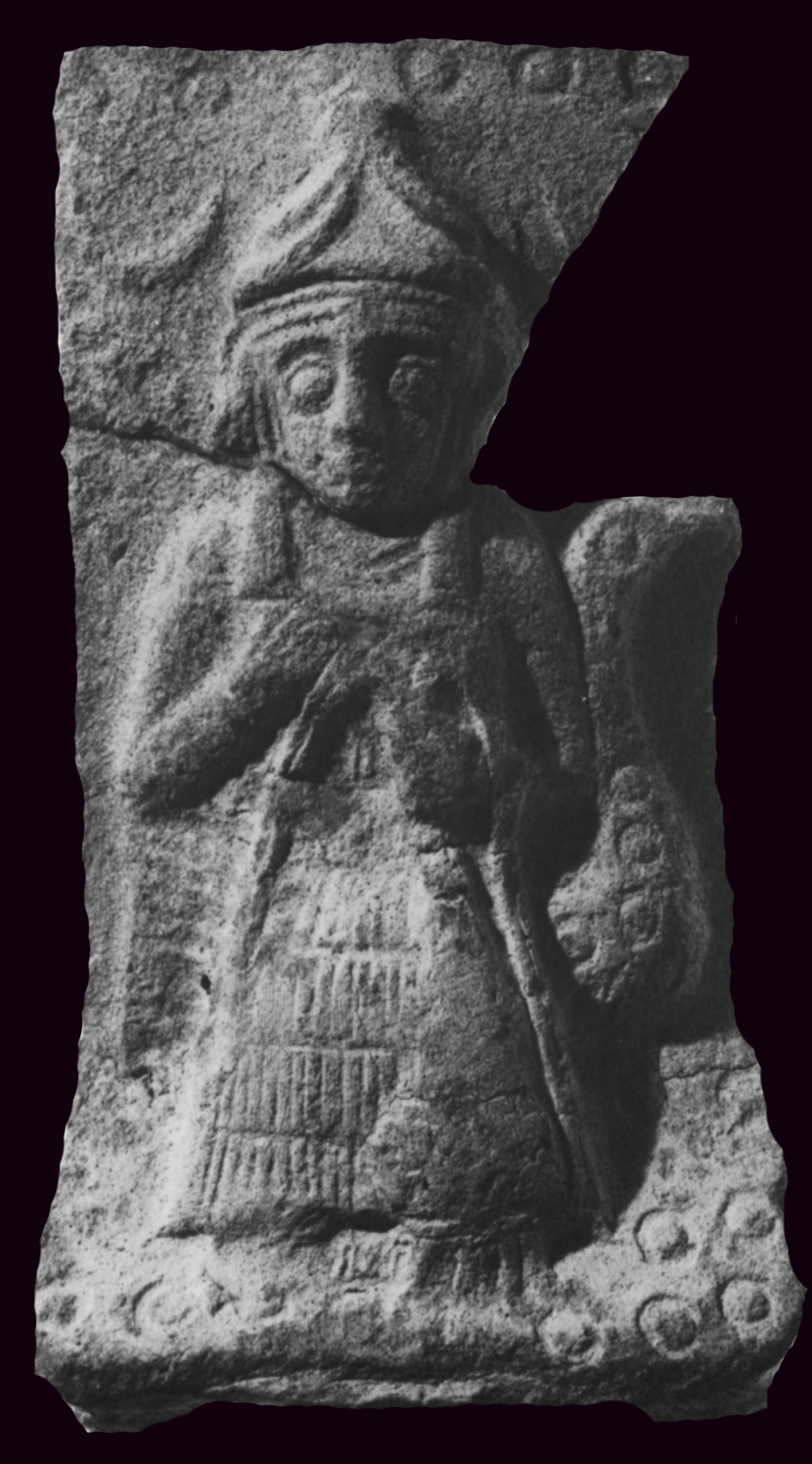
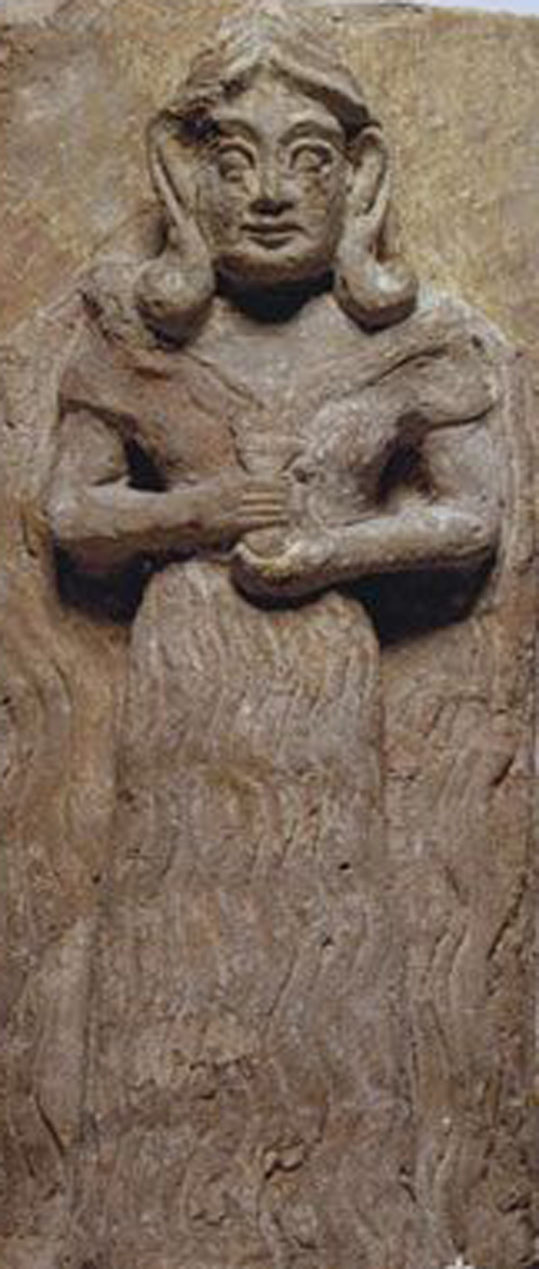
The primary motif of the streams of fish bearing water always relates to Enki and that extends to his daughter Na-zi and the related cult of fish sages, Gudea as the King could also hold the pouring jar, the four pourings of the Kumbh Mela can also be related to the four Celestial pourings of the Gudea basin from the Ab-zu shrine of Girsu, were there are four Heavenly outpourings and seven standing Goddesses.
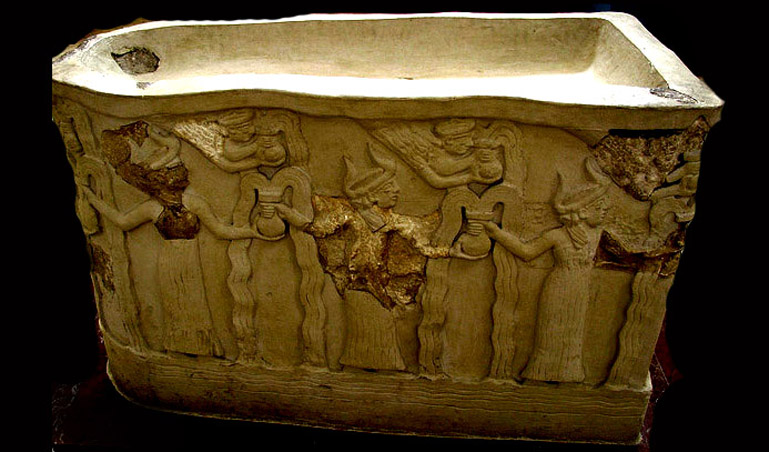
It's all very odd but i suppose the worst thing that could happen is that an evil Earthly power attains Heavenly power through it's upward mobility, it would be best to cut that off at it's base.
I was looking at the Hindu tradition of Aquarius as the water jar Kumbha as in the Kumbh Mela which correlates with Mesopotamian tradition.
Indra cursed Vayu and Agni to fall down on Earth from Swarga( heaven) and both the Devas entered into a Jala Kumbha or Water Pitcher as a single body. Meanwhile, Sages Nara and Narayana were in Tapasya ( penance) on Gandhamadana Mountain, and Indra was concerned that they might be a threat to his chair; he despatched a few Apsaras to the Mountain along with Kamadeva ( Lord of Love) but their attempts to tempt the Maharshis failed. As the Apsaras continued to be stationed there, Narayana Rishi created a damsel of exquisite attraction from his thighs and named her Urvasi; he desired that Apsaras should realize that their beauty was nothing compared to whom they could materialize as Urvasi and they could not possibly tempt Nara Narayan Maharshis. Mitra -Varuna happened to see the damsel and could not resist the fall of their combined semen of Mitravaruna which was deposited in the same Jala Kumbha (pitcher) that fell down from the Swarga and thus Agastya was born as Kumbha Sambhava.
Kumbha

They always come up with a mad version of everything but the elements are traditional, seductive fish nymph Apsaras of the Apsu, and the streams of water from the jar and the fishes contained theirin were understood to extend from Aquarius to Piscis Austrinus, the sages having travelled through those same streams.

This Hindu legend describes the creation of a "pot of amrita (nectar of immortality)" after the forces of good and evil churn the ocean of creation. The gods and demons fight over this pot, the "kumbh," of nectar in order to gain immortality. In a later day extension to the legend, the pot is spilled at four places, and that is the origin of the four Kumbha Melas.

The primary motif of the streams of fish bearing water always relates to Enki and that extends to his daughter Na-zi and the related cult of fish sages, Gudea as the King could also hold the pouring jar, the four pourings of the Kumbh Mela can also be related to the four Celestial pourings of the Gudea basin from the Ab-zu shrine of Girsu, were there are four Heavenly outpourings and seven standing Goddesses.

edit on 8-2-2022 by Madrusa because: (no reason given)
a reply to: Madrusa
All does seem strange, surely it will get cut from the root if that is the plan, which I would think it is with heaven being basically beneficent and evil not. Unless there is some sort of long game that can't be seen from here, the growth aspect of negative polarity has come to an end, so the black cube will to. The power of Heaven may well become manifest on Earth for this to be bought about, a far more satifactory outcome really.
Wonder if Adapta breaking the wings of the Anzu bird and stilling the south wind for seven days has any bearing on this, Anu was angry, Heaven was lost to him, maybe the timing just wasn't right?
Asar/Shaman and sage Adapta seem to be parallels, both being sons of Enki, although the latter is mortal semi divine between Heaven and Earth as the predeluvian sages were, maybe Adapta is his avatar. Asaruludu as Namshub (shining) "the shining god that illuminates our path" comes close to Adapta as Uan(na), “the light of An”.
The Sage story weaves into the Goddess's cauldron.
The Hindu myths are colourful, maybe a bit to much soma giving Mitra-Varuna control issues. At least he didn't do it with a rock like Kumarbi, that sounds painful, noted his names similarity to Kumbha but don't know if it's significant in any way.
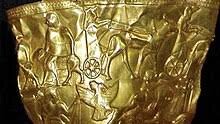
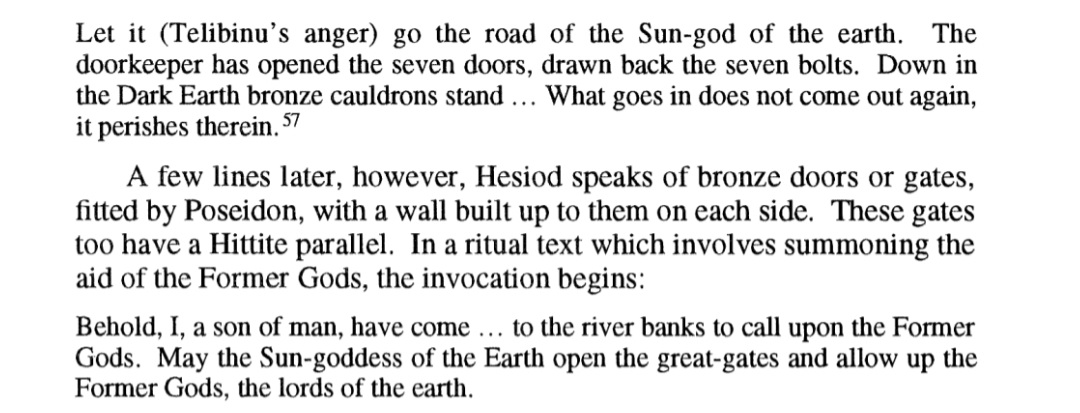
So we come to the Gundestrup cauldron again as the kumbh containing the nectar of immortality. The three main Celtic underworld gods: Cernunnos, Karidven and Dagda had magic pots, the second two granting immortality and prosperity.
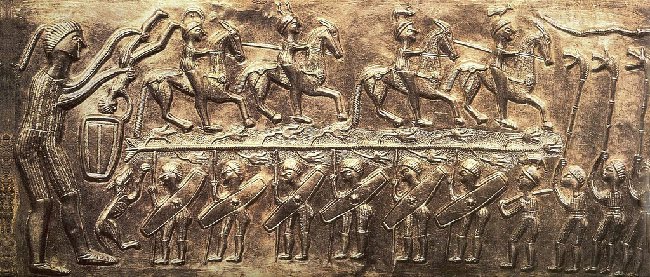
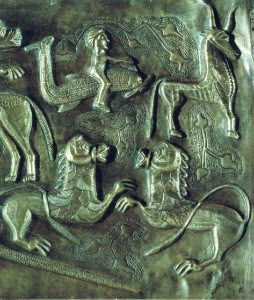
Horns, stag men, sensuous water dryads, swear I've heard this story somewhere before... the mysterious deep.
All does seem strange, surely it will get cut from the root if that is the plan, which I would think it is with heaven being basically beneficent and evil not. Unless there is some sort of long game that can't be seen from here, the growth aspect of negative polarity has come to an end, so the black cube will to. The power of Heaven may well become manifest on Earth for this to be bought about, a far more satifactory outcome really.
Wonder if Adapta breaking the wings of the Anzu bird and stilling the south wind for seven days has any bearing on this, Anu was angry, Heaven was lost to him, maybe the timing just wasn't right?
Asar/Shaman and sage Adapta seem to be parallels, both being sons of Enki, although the latter is mortal semi divine between Heaven and Earth as the predeluvian sages were, maybe Adapta is his avatar. Asaruludu as Namshub (shining) "the shining god that illuminates our path" comes close to Adapta as Uan(na), “the light of An”.
The Sage story weaves into the Goddess's cauldron.
There the sages (called ummiānu) seem to be guilty by implication since we are told that they were dispatched for good to the apsu at the time of the flood and may have been deprived access to the mes-tree, “the flesh of the gods,” which provided them with the special material to make divine and kingly statues (as well as knowledge, skill and longevity?), but which was hidden from them (and all future mortals) forever when Marduk cast it into the deep.
If the flood is the same Abubu perhaps the mes-tree (see footnote 11 below) may be compared with the plant (of life) whose hidden location in the deep Utnapishtim revealed to Gilgamesh.
The Hindu myths are colourful, maybe a bit to much soma giving Mitra-Varuna control issues. At least he didn't do it with a rock like Kumarbi, that sounds painful, noted his names similarity to Kumbha but don't know if it's significant in any way.


So we come to the Gundestrup cauldron again as the kumbh containing the nectar of immortality. The three main Celtic underworld gods: Cernunnos, Karidven and Dagda had magic pots, the second two granting immortality and prosperity.

www.labyrinthdesigners.org...
The ancient British God of the Sea was said to have a magic cauldron in which he placed the bodies of men who had been slain in battle and brought them back to life again.
In Norway this cauldron is defined as the “seething cauldron”, because from it the drizzle formed from fire and ice coalesces and thus life can be formulated. One of these goddesses was Karidven mostly represented on a throne, from where she managed Death and Life. On her left hand she held the regenerating vessel which permitted the eternal sublimation of beings. She really was the divine door which the Soul looking for immortality must necessarily go through.
Mircea Eliade, deep connoisseur of celtic tradition, wrote on the topic: “ According to celtic people the cauldron is comparable to the horn, or vessel, of abundance, or cornucopia.

Horns, stag men, sensuous water dryads, swear I've heard this story somewhere before... the mysterious deep.
edit on 10-2-2022 by primalfractal because: (no reason given)
a reply to: primalfractal
The key with Enki is always human potential, removing a bunch of fat old politicians and bankers from the halls of power isn't so hard as long as it is understood why it needs to be done and what needs to replace them, sometimes you just need to do it.
Dumu-zi-ab-zu as the son of the Abzu was expected to find the way in all instances.
Asar was also connected to the principle of the river of ordeal as was Nanse, a river with the banks of subjective and objective righteousness, it is necessary to understand the latter as a basis of rule.
Enki was always there with the advise but it was the son Asar that was expected to get things done, even if the seven sages returned they would only advise the same. Seth is the murderer of Asar/Osiris and Isis-Nanaya the one who facilitates his rebirth.
The key with Enki is always human potential, removing a bunch of fat old politicians and bankers from the halls of power isn't so hard as long as it is understood why it needs to be done and what needs to replace them, sometimes you just need to do it.
Dumu-zi-ab-zu as the son of the Abzu was expected to find the way in all instances.
"I am Asalluhi, who was born in the Eunir-temple"
"I am Asalluhi, who knows the depth of the vast netherworld-river
"I am Asalluhi, whom Laguda magnifies in the Lower Sea"
"I am Asalluhi, being the bond of all and the first-born of Mami."
"I am Asalluhi, unveiling cuneiform"
"I am Asalluhi, whose glare destroys a wall of stone"
"I am Asalluhi, inspecting esoteric sources, creating cosmic plans"
"I am Asalluhi, who removes illness and destroys the great demons
Asar was also connected to the principle of the river of ordeal as was Nanse, a river with the banks of subjective and objective righteousness, it is necessary to understand the latter as a basis of rule.
O city rising from the abzu like barley, cloudy plain, taking the divine powers from its midst, Kuara, your foundation and just banqueting hall, the lord who does not hold back his goods stands ready for admiration. The Seven Sages have enlarged it for you from the south to the uplands.
Your prince, the most precious prince Asarluḫi, the most precious one, is a warrior, born a noble prince, a leopard who seizes prey. He is like an onrushing storm battering the rebel land. As long as it remains disobedient, he pours spittle upon it. Asar-alim-nuna, the son of the abzu, has erected a house in your precinct, O house Kuara, and taken his seat upon your dais.
Enki has named you with the River of the ordeal, the sublime course. You cleanse the just man like gold, and you hand over the wicked to extinction
Enki was always there with the advise but it was the son Asar that was expected to get things done, even if the seven sages returned they would only advise the same. Seth is the murderer of Asar/Osiris and Isis-Nanaya the one who facilitates his rebirth.
edit on 11-2-2022 by Madrusa because: (no reason given)
a reply to: Madrusa
Found it interesting how Namshub is a name for Asar and namšub means incantation, which has been Anglicanised to Namshub and given a pop culture meaning of self fulfilling prophecy. Likened to a meme or viral video but with superpowers, some sort of mass brain reprogramming. We really could do with something like that these days in a positive sense, guess it's happening in a way.
Shirnamšub an incantation hymn, this one being about how awesome Inanna is 😊
And this would be a more modern namshub version.
Found it interesting how Namshub is a name for Asar and namšub means incantation, which has been Anglicanised to Namshub and given a pop culture meaning of self fulfilling prophecy. Likened to a meme or viral video but with superpowers, some sort of mass brain reprogramming. We really could do with something like that these days in a positive sense, guess it's happening in a way.
Shirnamšub an incantation hymn, this one being about how awesome Inanna is 😊
I am milk of the god. I am pre-eminent in the mountains. I am the milk of the god, of Dumuzid. I am pre-eminent in the mountains. The mountains in my hands, the mountains at my feet, Elam in my hands; I have a pointed dagger in my belt. The gods are small birds, and I am the falcon. The Anuna gods butt each other, but I am the wild cow. I am the grandiloquent daughter of Enlil. I am the formidable one of my father Suen. I am the queen created by Nudimmud.
And this would be a more modern namshub version.
a reply to: primalfractal
Yes the personification of the purification and healing incantations, also Ningirim was the personification of the word made effective.
It's interesting to compare the seven water pouring figures on the Gudea basin with the seven Angels that pour out plagues in the Book of Revelations, a complete reversal of that tradition, and it's very telling that the Seth-Typhonians unleash their Bio-terrorism at the onset of the Age of Aquarius as the evil inversion, but it is in their nature to do so and that's what needs to be understood in order to counter them effectively.
Yes the personification of the purification and healing incantations, also Ningirim was the personification of the word made effective.
the evil genius and the evil alû-demons incline their head before the basin with water of purification of Ningirim, and the god of that man will duly praise Enki, Nammu, and Asari, the son of Eridu.
The incantation-speech of Ningirim, the lady of sweet Šuruppak, the incantations of Asalluhi, child of Enki in the abzu, cannot be undone.
May the incantations of the Abzu of Eridu,of Asalluhi, son of Eridu,not be broken.
It's interesting to compare the seven water pouring figures on the Gudea basin with the seven Angels that pour out plagues in the Book of Revelations, a complete reversal of that tradition, and it's very telling that the Seth-Typhonians unleash their Bio-terrorism at the onset of the Age of Aquarius as the evil inversion, but it is in their nature to do so and that's what needs to be understood in order to counter them effectively.
water, well-natured (receiving a good nature) in the mountain flood-water, well-natured in the mountain, deep in the mountains!
Well-natured between low and high land in an immaculate spot, well-natured in the (cosmic) popular, which cannot be withstood,well-natured, (dripping) from the thick horns of the stag, well-natured (flowing through) the split horned plants (moss),well-natured, (flowing from) the cow-shaped horn of the mouflon.
Running by itself (?), carrying splendor, the king, the son of his god on the pure quay, purify, make shining!
edit on 14-2-2022 by Madrusa because: (no reason given)
a reply to: Madrusa
Along those lines I guess the four Celestial pourings of the Gudea basin when inverted could be compared to the four horseman.
Jehovah Sabaoth was always backwards, why would anyone worship something that plans to kill 2/3 of humanity, that is in no way justice, it's a horror only desired by a foul creature. Set/YHWH is a blatant death god, the OT is full of murder, rape, pillage and human sacrifice all in the name of the "Lord".
What a bastard, but yes it's in your nature if you are Baal Zephon aka Typhon/Set and his Hebrew followers.
Lucky the apocalypse is fake and gay, as far as the demon calling for it does not have the power to bring it about. Sure the Cabal will have a crack at it, the signs they are starting now are clear, yet it's all a lie and in that lie is their downfall. The age of Aquarius is here, and the waters from Heaven will wash the Earth clean.
Along those lines I guess the four Celestial pourings of the Gudea basin when inverted could be compared to the four horseman.
Jehovah Sabaoth was always backwards, why would anyone worship something that plans to kill 2/3 of humanity, that is in no way justice, it's a horror only desired by a foul creature. Set/YHWH is a blatant death god, the OT is full of murder, rape, pillage and human sacrifice all in the name of the "Lord".
“Take your son, your only son – yes, Isaac, whom you love so much – and go to the land of Moriah. Sacrifice him there as a burnt offering on one of the mountains, which I will point out to you.”
“Note also that any one of his possessions which a man vows as doomed to the Lord, whether it is a human being or an animal, or a hereditary field, shall be neither sold nor ransomed; everything that is thus doomed becomes most sacred to the Lord. All human beings that are doomed lose the right to be redeemed; they must be put to death"
"I will give to the LORD the first thing coming out of my house to greet me when I return in triumph. I will sacrifice it as a burnt offering...
When Jephthah returned home to Mizpah, his daughter – his only child – ran out to meet him...
her father kept his vow, and she died a virgin"
"On you he will sacrifice the priests from the pagan shrines who come here to burn incense, and human bones will be burned on you"
"Put the entire town to the torch as a burnt offering to the LORD your God"
What a bastard, but yes it's in your nature if you are Baal Zephon aka Typhon/Set and his Hebrew followers.
And in that day, declares the LORD, you will call me ‘My Husband,’ and no longer will you call me ‘My Baal'
Lucky the apocalypse is fake and gay, as far as the demon calling for it does not have the power to bring it about. Sure the Cabal will have a crack at it, the signs they are starting now are clear, yet it's all a lie and in that lie is their downfall. The age of Aquarius is here, and the waters from Heaven will wash the Earth clean.
edit on 15-2-2022 by primalfractal because: (no reason given)
a reply to: primalfractal
There are examples were Jesus is refered to as ABERAMENTHO in the Pistis Sophia and were this is understood as Seth-Typhon in the Magical corpus, this is Seth as the counterpart to Asar/Osiris.
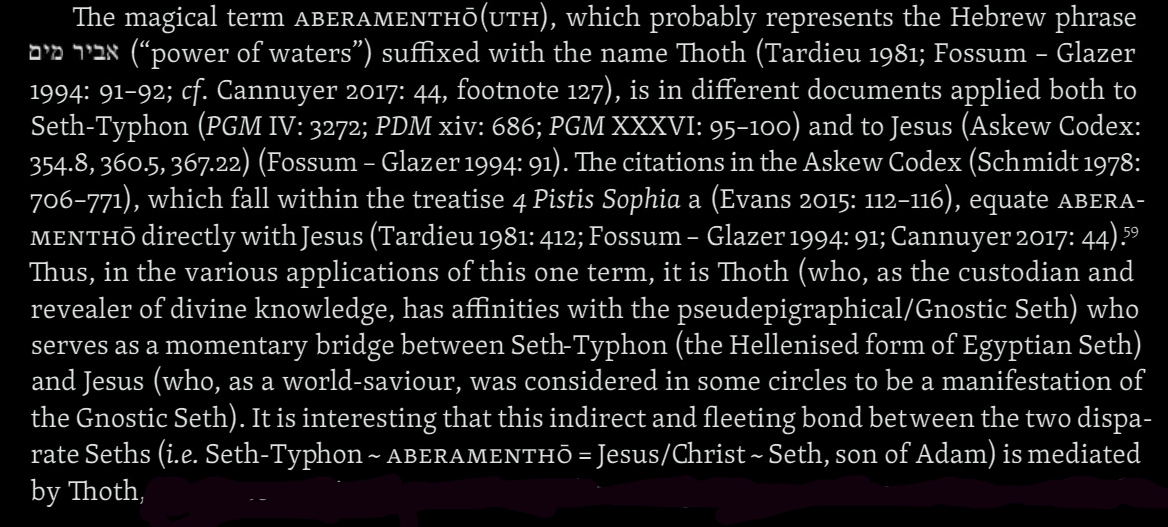
It is natural that a concern with cataclysm and apocalypse will arise from such alignment, that in effect it is the faith in such that empowers the phenomena.

Magical papyri
There are examples were Jesus is refered to as ABERAMENTHO in the Pistis Sophia and were this is understood as Seth-Typhon in the Magical corpus, this is Seth as the counterpart to Asar/Osiris.

It is natural that a concern with cataclysm and apocalypse will arise from such alignment, that in effect it is the faith in such that empowers the phenomena.

Magical papyri
a reply to: Madrusa
Seems I'm on a run of bible quotes...
Jesus also promoted transgender agenda which is super weird, haven't heard this one before 😂
Not sure if it's meaningful but there is a possible phonetic similarity between Humbaba/Huwawa and YHWH as Ya-Huwah.
Found some bible mention of connection between Mt Zion and the Typhonian takeover of Mt Zaphon.
He often rocks up as a pillar of fire and smoke which is quite reminiscent of Typhons vulcanism.
Some more human sacrifice evidence, looks like they have a thing for first born sons.
There is also scholarly consensus.
I'd say child sacrifice was only outwardly condemned at a late age in the history of Israel, and still secretly conducted by the ruling Cabal and various other cults like the Sabbateans, right up until now.
Seems I'm on a run of bible quotes...
Jesus also promoted transgender agenda which is super weird, haven't heard this one before 😂
For there are eunuchs, that were so born from their mother’s womb: and there are eunuchs, that were made eunuchs by men: and there are eunuchs, that made themselves eunuchs for the kingdom of heaven’s sake. He that is able to receive it, let him receive it (Matthew 19:12).
Not sure if it's meaningful but there is a possible phonetic similarity between Humbaba/Huwawa and YHWH as Ya-Huwah.
the name ‘Yahweh’ does not even sound Semitic, he produces examples from Exodus 15 with “Yahweh” and “Yahowah” in the same sentences. Those with “Yahowah” sound “smooth and poetic,” while those with “Yahweh” “sound rough and unrythmical.
The accumulated data points heavily in the direction of a three syllable word, whose middle syllable was hô or hû. The first two syllables were Yahû or Yahô that were sometimes abbreviated to Yô
Found some bible mention of connection between Mt Zion and the Typhonian takeover of Mt Zaphon.
Isaiah 14:13-14: I will sit on the Mount of Assembly in the recesses of Zaphon. I will climb to the top of thunderclouds, I will rival the Most High
Yahweh is great and supremely to be praised, in the city of our God, the holy mountain, beautiful where it rises, joy of the whole world; Mount Zion, in the recesses of Zaphon, the city of the great king; here among her palaces, God proved to be her fortress. (Psalm 48:1-3)
He often rocks up as a pillar of fire and smoke which is quite reminiscent of Typhons vulcanism.
Psalm 18:18 “smoke rose from his nostrils; consuming fire came from his mouth, burning coals blazed out of it.”
Some more human sacrifice evidence, looks like they have a thing for first born sons.
Exodus 22:29-30
“You shall not delay to offer from the fullness of your harvest and from the outflow of your presses. The first-born of your sons you shall give to me. You shall do likewise with your oxen and with your sheep: seven days it shall be with its dam; on the eighth day you shall give it to me.”
Ezekiel 20:25-26
“Moreover I gave them statutes that were not good and ordinances by which they could not have life; and I defiled them through their very gifts in making them offer by fire all their first-born, that I might horrify them; I did it that they might know that I am the LORD.”
There is also scholarly consensus.
books.google.com...
While there is considerable controversy about the matter, the consensus over the last decade concludes that child sacrifice was a part of ancient Israelite religion to large segments of Israelite communities of various periods
www.talkreason.org...
For most of biblical history, Yahweh was not against child sacrifice per se, but rather against child sacrifice to other gods.
Levenson states that "only at a particular stage rather late in the history of Israel was child sacrifice branded as counter to the will of YHWH and thus ipso facto idolatrous.
I'd say child sacrifice was only outwardly condemned at a late age in the history of Israel, and still secretly conducted by the ruling Cabal and various other cults like the Sabbateans, right up until now.
brill.com...
the cult of child sacrifice was felt in some circles to be a legitimate expression of Yawistic faith
edit on 16-2-2022 by primalfractal because: (no reason given)
new topics
-
New UK Petition - Close the borders! Suspend ALL immigration for 5 years!
Regional Politics: 1 minutes ago -
The Looking Glass - Episode 3: The Path of Least Resistance
Short Stories: 2 hours ago -
Credit card debt
Relationships: 4 hours ago -
President-elect Trump asks the Supreme Court to Let Tik-Tok Continue Operating in the U.S..
Mainstream News: 4 hours ago -
Treasury Secretary Janet Yellen Says The USA Will Be in Debt Default in Jan 2025 - Unless...
Mainstream News: 8 hours ago -
Trash To Treasure: Dumpster Diving With Mike The Scavenger
General Chit Chat: 9 hours ago -
Danish Prime Minister said to keep 3 days worth of canned goods on hand
World War Three: 9 hours ago
top topics
-
The hunter has become the hunted
Politicians & People: 12 hours ago, 19 flags -
Trump's idea to make Canada the 51st US state: 'Potential is massive'
Mainstream News: 13 hours ago, 14 flags -
Danish Prime Minister said to keep 3 days worth of canned goods on hand
World War Three: 9 hours ago, 5 flags -
Treasury Secretary Janet Yellen Says The USA Will Be in Debt Default in Jan 2025 - Unless...
Mainstream News: 8 hours ago, 5 flags -
Trash To Treasure: Dumpster Diving With Mike The Scavenger
General Chit Chat: 9 hours ago, 3 flags -
Credit card debt
Relationships: 4 hours ago, 2 flags -
President-elect Trump asks the Supreme Court to Let Tik-Tok Continue Operating in the U.S..
Mainstream News: 4 hours ago, 1 flags -
The Looking Glass - Episode 3: The Path of Least Resistance
Short Stories: 2 hours ago, 1 flags -
New UK Petition - Close the borders! Suspend ALL immigration for 5 years!
Regional Politics: 1 minutes ago, 0 flags
active topics
-
New UK Petition - Close the borders! Suspend ALL immigration for 5 years!
Regional Politics • 0 • : gortex -
Trump's idea to make Canada the 51st US state: 'Potential is massive'
Mainstream News • 44 • : Freeborn -
-@TH3WH17ERABB17- -Q- ---TIME TO SHOW THE WORLD--- -Part- --44--
Dissecting Disinformation • 3829 • : Crazierfox -
The Looking Glass - Episode 3: The Path of Least Resistance
Short Stories • 3 • : JJproductions -
Credit card debt
Relationships • 2 • : JJproductions -
Danish Prime Minister said to keep 3 days worth of canned goods on hand
World War Three • 5 • : DerBeobachter2 -
No Wonder We Are In Such INSANE Debt- Americans MUST Put a Stop to This
US Political Madness • 68 • : BernnieJGato -
President-elect Trump asks the Supreme Court to Let Tik-Tok Continue Operating in the U.S..
Mainstream News • 15 • : TheMisguidedAngel -
Elon Musk futurist?
Dreams & Predictions • 21 • : cherokeetroy -
Treasury Secretary Janet Yellen Says The USA Will Be in Debt Default in Jan 2025 - Unless...
Mainstream News • 21 • : WeMustCare
